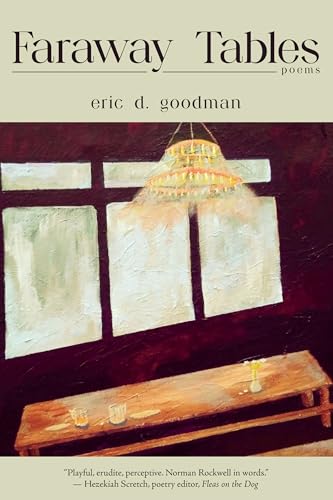
In his first collection of poems, Goodman moves around in time and space, recalling past travels, anticipating the future, both near and far. Most of all, he pays attention to the world, noting small details as he finds meaning in seemingly ordinary moments, whether it’s making a cup of coffee or winding the clock.
In “Relics” he and a childhood friend, newly reunited, explore Baltimore’s Museum of Industry.
Decades may have passed between us,
but our bond remains durable,
like these vestiges of a bygone age.
We consider the divergent occurrences in our lives
as we glance at the vintage printing press,
a demonstration sharing with us
how easily the movable letters connect,
disconnect, reconnect.
Having reviewed two of his novels on this blog, Setting the Family Free and Wrecks and Ruins, I can detect fingerprints of those stories here. There’s the appreciation of things that are imperfect or ephemeral. There’s also an appreciation of other points of view, such as in “Pests” where he considers the effect of the pandemic shutdown on mice and other creatures who prowl the cubicles at night searching for cookie crumbs and trail mix.
Many of these poems were written during the pandemic, such as “Embracing Hermithood” which begins:
The hair is the first to grow.
The salt-and-pepper business cut
filling out into a lion’s mane,
gushing down the head and over the shoulders
like a SWAT team’s rappelling ropes over a fortress
during the raid on an out-of-control dictator
threatening our nation.
He touches on and personalizes recent events, such as the war in Ukraine. He remembers a trip by his children to Kiev shortly before the war and his own visit to Russia “just after the Iron Curtain fell.”
When this passes,
let my adult children stand
in Independence Square again
alongside the children
of my Ukrainian and Russian friends
and let the new generation toast
to international friendship
just as we did, so sincerely, not so long ago.
Some of the poems address aspects of the climate emergency—like drought and falling water levels—and consumerism—such as the social costs of avocado toast and bottled water. Humor and the music of words come together in poems such as “Dogged Memories” which begins:
Oh, Bratwurst,
I’ve spent time with you in the rowdy beer halls of Munich,
pierced you with fork and pulled you from a pool of kraut,
dipped you in spiced mustard and washed you down with bitter beer.
As Goodman notes in his Afterword, poetry is appropriate for today’s readers because it is not only short but also concise, conveying idea or emotion with few words. He also notes that the pandemic was “a time to question life as we know it,” looking back on what we’ve experienced and imagining the new world awaiting us.
What poems have you been reading during this National Poetry Month?